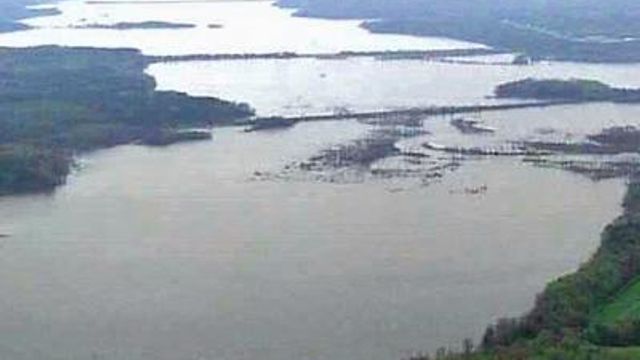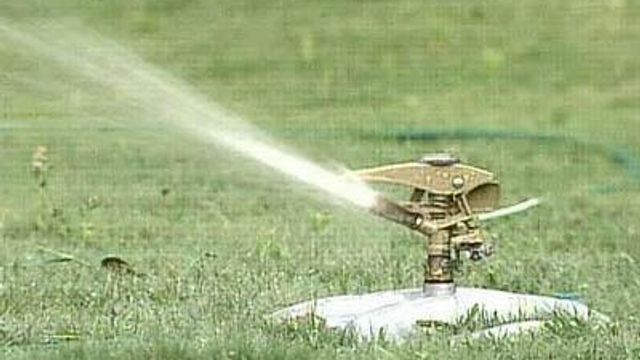Sprinklers, Washing Cars No Longer Banned
The drought lingers, but Raleigh officials said residents and businesses can start turning the spigot on again because Falls Lake is full.
Posted — UpdatedThe loosened restrictions also brought breathing room for "green" industries – such as nurseries and street cleaners – that depend on water.
"I'm glad that they (Raleigh city leaders) did what they said they were going to do," said Michael Hoskins, owner of Groundscapes of N.C., which lost more than half of its business and staff during the drought. "They were going to lift restrictions and they did, as soon as the first business day after it happened. We are happy about that."
Six rainy days last week helped fill Falls Lake, the city's primary reservoir, for the first time in 11 months. The lake topped the 251.5-foot level at which it is considered full on Sunday evening.
The last time Falls Lake was above its full level was last May, according to records of the Army Corps of Engineers, which manages the lake. As recently as a month ago, the lake was nearly 8 feet below normal.
The prolonged drought and the dried-up lake prompted city officials to enact Stage 2 restrictions on Feb. 15, prohibiting the use of city water for outdoor irrigation and pressure washing. Car washes that weren't certified by the city also were forced to shut down.
Returning to Stage 1 rules allows residents with odd-number addresses to water their lawns on Tuesdays, while those with even-number addresses can use their sprinklers on Wednesdays. People can use a hand-held hose for watering on those days, as well as on Saturdays for odd-number addresses and Sundays for even-number addresses.
"I'm happy, because I know that what I've hoped for and the faith that I've had has once again come through," said Phil Campbell, who owns a local nursery.
Gary Adcock said his business, Clean Streets, saw a 75 percent drop in profit after he had to pay for his tankers to fill up at waste-water treatment plants.
"It's been bad," Adcock said. "We've just making ends meet, thankful that were are still in business."
Automatic sprinkler systems can be operated only between midnight and 10 a.m. on the specified day, while hand-held hoses and hose-end sprinklers can be used from 6 to 10 a.m. and 6 to 10 p.m.
People can wash their cars at home and power-wash their homes, driveways and sidewalks only on weekends.
Violators of the new rules face a $200 fine, and a $1,000 fine for a second offense.
In lifting the Stage 2 restrictions, Mayor Charles Meeker thanked residents for their conservation efforts in recent months.
"Our community was facing a very challenging situation," Meeker said. "We have been fortunate. The drought of 2007-2008 was unprecedented, but we have been able to get through it."
But the mayor warned people to be prepared for Stage 1 restrictions to become the norm all year long.
"During the recent drought, we've had the toughest restrictions in the state, and looking forward, we may stay in that position," he said. "The point here is to focus on water conservation – to treat water as a really important resource – not only when the lake is full, but to be in good position in dry spells.
"(A drought) will likely happen again. I can't tell you if it will be this summer or in five years."
State Climatologist Ryan Boyles said the current drought is ongoing, noting lake levels aren't a good standard to measure the water crisis.
"When you start looking under the surface, the base flow, the rivers, the water table is still well below where it should be for this time of year," Boyles said.
Since April 1, the National Weather Service has recorded 1.31 inches of rain at Raleigh-Durham International Airport and 3.64 inches in Fayetteville.
But Boyles said groundwater recharges slower than area lakes, so it will take several weeks – or even months – before groundwater levels are back to normal. Until then, a lengthy dry spell could quickly drain Falls Lake again, he said.
"If your base water is low, any type of short-term dryness – a few weeks to a month – can dramatically deplete your reservoirs," he said.
Meeker said the city is taking steps to ensure an adequate water supply through the summer, such as asking the Army Corps of Engineers to raise the level at which the lake is considered full by 2 feet, to 253.5 feet. Such a move would add millions of gallons of capacity to the lake.
"We are planning as though we're going to have more dry weather this spring and summer," Meeker said.
Wake County commissioners on Monday reviewed a proposal to build a dam and reservoir on the Little River in the eastern part of the county to boost area water supplies.
Johnston County officials also voted Monday to implement an alternate-day system for outdoor watering. People with odd-number addresses will be allowed to water on Tuesdays, Thursdays and Saturdays, while those with even-number addresses can water on Wednesdays, Fridays and Sundays.
The Orange Water and Sewer Authority also plans to discuss its water restrictions this week. Its rules banning outdoor watering went into effect March 1, but its three lakes are about 69 percent filled, up from 59 percent a week ago.
• Credits
Copyright 2024 by Capitol Broadcasting Company. All rights reserved. This material may not be published, broadcast, rewritten or redistributed.






